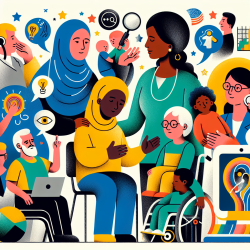As practitioners dedicated to supporting the communicative competence of older adults, understanding the nuanced changes in conversational skills due to aging is crucial. The research article by Garcia and Orange offers a profound exploration into the conversational discourse of older adults, providing a valuable resource for speech-language pathologists aiming to enhance their practice. This blog post aims to unpack the key findings of Garcia and Orange's research and discuss how practitioners can implement these insights or pursue further research to improve their skills.
Garcia and Orange's article meticulously reviews over sixty references to delineate a coherent set of features defining conversational skills in normal-speaking older adults. Their work underscores the complexity of conversational discourse, highlighting the interplay between linguistic, cognitive, and sociolinguistic/psycho-social aspects. One of the critical takeaways is that no single analysis can fully capture the conversational profile of older adults, suggesting the necessity for a multi-faceted approach in assessment and intervention.
For practitioners, this means moving beyond strictly structural or linguistic assessments to consider the broader functional aspects of communication. Conversational skills in older adults cannot be fully understood without considering intentionality, motivation, and situational contexts. This comprehensive approach can reveal the pragmatic functions of language use, which are often not apparent through structural analysis alone.
Implementing Research Outcomes:
- Adopt a Multidimensional Assessment Approach: Embrace the complexity of conversational skills by incorporating linguistic, cognitive, and sociolinguistic/psycho-social assessments. This holistic view can provide a more accurate understanding of an older adult's communicative abilities and challenges.
- Focus on Functional Communication: Shift the focus from merely assessing linguistic correctness to evaluating how effectively an individual uses language in real-life situations. This includes understanding the intentions behind utterances, the ability to navigate social interactions, and adapting communication strategies to different contexts.
- Consider Environmental and Personal Factors: Acknowledge that conversational skills are influenced by more than just age. Factors such as motivation, social environment, and situational contexts play a significant role in how older adults communicate. Tailoring interventions to address these factors can lead to more effective outcomes.
- Encourage Self-Appraisal: Integrate methods that allow older adults to reflect on and articulate their perceptions of their communicative abilities and challenges. This can provide valuable insights into their self-appraisal of conversational skills and guide more personalized interventions.
Encouraging Further Research:
While Garcia and Orange's article provides a solid foundation, there is still much to learn about the conversational skills of older adults. Practitioners can contribute to this field by:
- Exploring the impact of non-linguistic factors on communication, such as emotional well-being, social networks, and physical health.
- Investigating the effectiveness of specific intervention strategies designed to enhance conversational skills in older adults.
- Conducting longitudinal studies to understand how conversational skills evolve with age and identifying factors that contribute to resilience in communication abilities.
By engaging in and supporting research efforts, practitioners can continue to refine their approaches to supporting older adults' communicative competence, ensuring interventions are evidence-based and tailored to the unique needs of this population.
In conclusion, Garcia and Orange's research underscores the complexity of conversational skills in older adults and the need for a multifaceted approach to assessment and intervention. By implementing the outcomes of this research and pursuing further studies, practitioners can enhance their skills, contributing to better communication outcomes for older adults. The journey to understanding and supporting the conversational skills of older adults is ongoing, and every practitioner has a role to play in advancing this important field.
To read the original research paper, please follow this link: Commentary on The Analysis of Conversational Skills of Older Adults: A Review of Approaches by Garcia and Orange.










